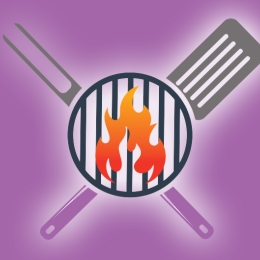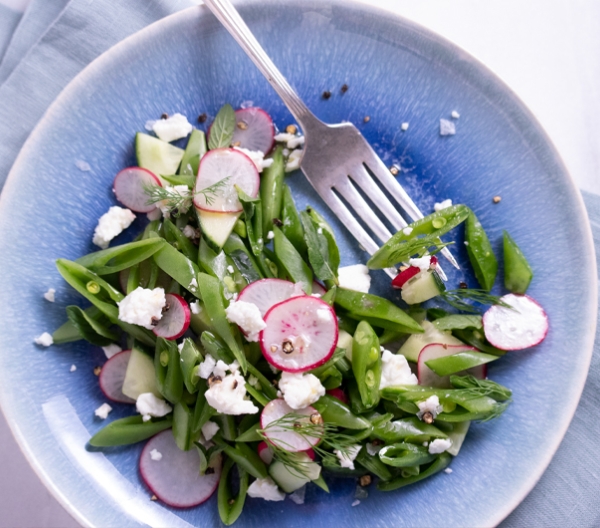How to steer clear of food poisoning this summer
This article is free for a limited time. Because CSPI takes no corporate or government donations, we rely on supporters like you to fuel our content. Donate now. |
Who doesn’t love summer’s outdoor feasts? Maybe you, if a case of food poisoning strikes. Here’s how to avoid some common hot-weather pitfalls, especially if you’re at high risk—you’re over 65 or under 5, pregnant, or have a weakened immune system.
How to prevent food poisoning at picnics & parties

- Stay cool. Don’t leave perishable foods unrefrigerated (or out of a cooler) for more than two hours...or one hour if it’s above 90°F.
- All prepared foods matter. Heard that only mayo-based salads are at risk if they sit out too long? That’s a myth. It’s also salads of all kinds, cut fruit, cheese, meat, leftovers, etc.
- Rinse, then cut. Before cutting, rinse fruits and vegetables under running water, even if you don’t plan to eat their peel or rind (like melons). Why? A knife can transfer pathogens from rind to flesh. Use a produce brush to scrub melon, avocado, and other firm fruits or vegetables.
- Cook that seafood. Raw oysters or other shellfish can harbor Vibrio, which typically causes diarrhea and vomiting. Though rare, severe infections can be deadly. Having a seafood boil? Throw out shellfish like clams or mussels that don’t open during cooking.
How to prevent food poisoning when grilling

- Thaw and marinate meat in the fridge. As you grill, don’t brush with used marinade, which has been contaminated by the raw meat.
- Start fresh. Don’t serve grilled meat on the plate you used when it was raw.
- Does that look done? Who can tell! Use an instant-read thermometer to make sure the thickest parts reach:
—165° F for chicken & turkey (ground or parts)
—160° F for ground beef, pork, & lamb (including burgers)
—145° F for beef, pork, & lamb steaks and chops (then let them rest for at least 3 minutes)
—145° F for fish (or until the flesh is opaque and separates easily with a fork)
More summer grilling advice
Safe and healthy grilling tips

How to prevent food poisoning when shopping at farmers markets, etc.

- Separate. Bring one reusable bag for meat, poultry, and eggs and another for produce or other foods. (Wash your bags often—ideally, after each use.) Pack perishables in an insulated cooler bag.
- Make sure milk, juice, or cider is pasteurized. The process kills harmful germs like Campylobacter and E. coli that can contaminate raw milk or unpasteurized juice or cider.
- Do a cold check. Only buy meat, eggs, and prepared foods that were kept in closed coolers with ice.
- Can it? For recipes and food-safety advice, see the USDA's Complete Guide to Home Canning.
More advice for safe food shopping
How to keep your food safe at the supermarket

How to prevent food poisoning while camping & backpacking

- Don’t drink untreated water from rivers, etc. Ditto for washing hands or dishes. If you can’t bring enough water with you, boil it for at least 1 minute, then let cool. Most water treatment methods remove or kill bacteria. What about viruses or parasites? Check the CDC's advice.
- Pack your cooler safely. That means plenty of ice. And double-bag raw meat in zipper bags so it won’t leak.
- Hand washing with soap beats sanitizer. That’s especially true if your hands are visibly dirty. In a pinch, alcohol-based hand sanitizers fight most germs, but they’re not a good bet for bugs like Cryptosporidium or norovirus.
Support CSPI today
As a nonprofit organization that takes no donations from industry or government, CSPI relies on the support of donors to continue our work in securing a safe, nutritious, and transparent food system. Every donation—no matter how small—helps CSPI continue improving food access, removing harmful additives, strengthening food safety, conducting and reviewing research, and reforming food labeling.
Please support CSPI today, and consider contributing monthly. Thank you.
Tags
Topics
Continue reading this article with a NutritionAction subscription
Already a subscriber? Log in

Let's get cooking
Recipes from The Healthy Cook
You can't get to healthy without delicious! That's where our recipes from The Healthy Cook, Kate Sherwood, come in. Search by categories like salads, soups, side dishes, vegetarian, vegan, and more.

